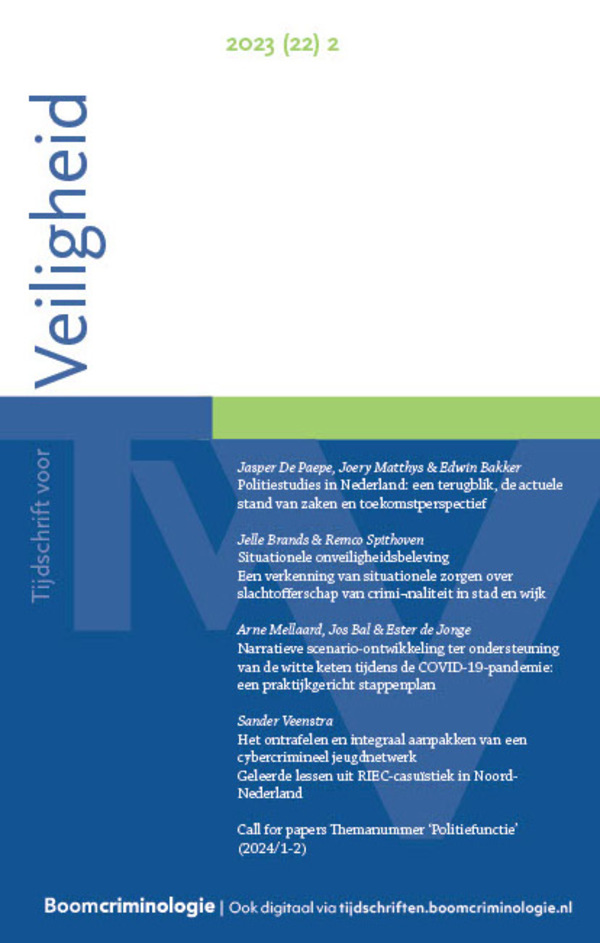|
An increasingly large degree of ‘public craftsmanship’ is demanded from professionals working in neighborhoods where citizens actively participate in security issues. The central question in this article is what role these neighbourhood professionals – mostly civil servants, (community) police officers and welfare professionals – play in facilitating and supporting civic projects in the field of security, how they create their ‘own’ social order outside of the formal policy domain of the organizations involved, and how they keep the public interest in mind. On the basis of three types of neighbourhood based projects – Neighbourhood Watches, ‘The Neighbourhood Governs’, and Residential Budgets – questions about the improvising and ‘crafting’ work of professionals are explored in this article. Such work is much needed in order to successfully establish connections between the different parties involved, navigate between the interests of citizens and organizations, recruit civilians while simultaneously amending their aspirations and expectations, safeguard public interests and ensure the progress of projects. Some professionals back away from these additional tasks and responsibilities they are increasingly face with. In many neighbourhoods much more is required from professionals however than the traditional roles as they were once defined by police, welfare and municipal organizations. In particular, the ‘new’ crafting professionals need to be able to deal with unreasonable expectations of ‘angry citizens’ who tend to dominate citizen participation in local security issues, act impartially and be accountable to the larger public, show personality and street credibility, and, finally, be attentive to unequal outcomes with regard to the distribution of safety and security projects in neighborhoods and districts. |


Tijdschrift voor Veiligheid
Over dit tijdschriftMeld u zich hier aan voor de attendering op dit tijdschrift zodat u direct een mail ontvangt als er een nieuw digitaal nummer is verschenen en u de artikelen online kunt lezen.
| Artikel |
Burgerparticipatie en ‘crafting’ in het lokale veiligheidsbeleid |
| Trefwoorden | neighbourhood professionals, crafting, citizen participation |
| Auteurs | Marco van der Land en Bas van Stokkom |
| SamenvattingAuteursinformatie |
| Artikel |
Positieve veiligheid: een kwestie van vertrouwen |
| Trefwoorden | positive security, trust, agency, public familiarity, social engineering |
| Auteurs | Fenna van Marle |
| SamenvattingAuteursinformatie |
|
The concept of security is mainly used in a negative way as it is related to the prevention and repression of matters which are perceived as not secure or not safe. This article provides a definition of positive security in order to provide a starting point for research and for working on positive security in the field. The influence of the belief in the idea of social engineering on the negative view of security is discussed and the way in which this is a hindrance to security. The meaning of the concept of security is outlined by focusing on the origin of this concept, the difference between objective and subjective security and by distinguishing it from the absence of crime. Research on public familiarity is covered which is argued to be an important concept in relation to positive security as it shows the importance of trust and predictability. The statement that trust is crucial to security is further supported by examining this relationship from a psychological perspective. In addition agency is introduced as the second factor, next to trust, as conditions for creating positive security. Finally, the focus is on the practical utility of the operationalisation of positive security for further research on the way positive security is shaped in practice. |
| Artikel |
Kwaadwillige intenties beter gedetecteerd met gecombineerde observaties |
| Trefwoorden | afwijkend gedrag, zakkenrollers, signaaldetectietheorie, toezichthouders |
| Auteurs | Dr. Remco Wijn en Dr. Jack Vogels |
| SamenvattingAuteursinformatie |
|
A single observation of deviant behavior by security officers often provides insufficient information about potential malicious intentions of individuals. This article shows that combining multiple security officers’ observations of deviant behaviors leads to better judgments about possible malicious intentions than judgments of individual officers. In the study described in this paper, experienced supervisors viewed CCTV images of a mall in which pickpockets were active (in reality these pickpockets were confederates). Participants could tag individuals in the footage if they felt that these individuals portrayed deviant behaviors. Using statistics based on signal detection theory, we calculated the accuracy with which individuals in the footage with hostile intentions (i.e., our confederates) were distinguished from individuals without hostile intentions (i.e., the general public). We compared the aggregated individual accuracy scores of participants to accuracy scores of combinations of 2, 3, or 4 participants. Results show that combining observations from two participants leads to higher accuracy than observations of individual supervisors. This effect is mainly caused by an increase in hits (correctly tagged pickpockets). As observations of more participants are added (viz., combinations of 3 or 4 participants) accuracy stagnates. This is mainly caused by an increase in false alarms (judged hostile by participants, but in reality innocent visitors). Implications are discussed for organizations in the security domain and for further research. |
